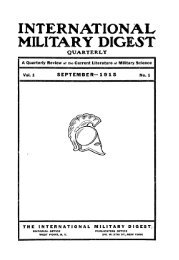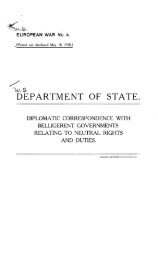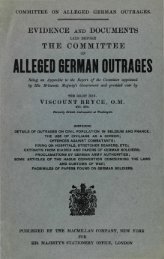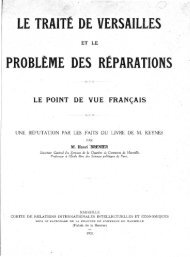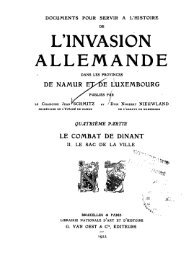PERSECUTIONS OF THE GREEKS IN TURKEY SINCE THE ...
PERSECUTIONS OF THE GREEKS IN TURKEY SINCE THE ...
PERSECUTIONS OF THE GREEKS IN TURKEY SINCE THE ...
You also want an ePaper? Increase the reach of your titles
YUMPU automatically turns print PDFs into web optimized ePapers that Google loves.
xiv <strong>IN</strong>TRODUCTION<br />
about Hellenism in Turkey are only too well known,<br />
and that, further, the decisions about banishing to the<br />
interior the Greek populations of the seacoast, were taken<br />
only after coming to an understanding with the German<br />
staff in Constantinople."<br />
The truth of this conception is confirmed by a telegram<br />
of Mr. Kallerges, the Greek Minister in Constantinople,<br />
to Mr. Zalocostas, the Minister of Foreign Affairs,<br />
dated March 28, 1917 (Ministerial Archives, No.<br />
2338). According to this the Minister of Germany,<br />
Count von Metternich, was recalled as a result of the<br />
direct intervention with the Kaiser of Enver Pasha<br />
and the German military circles in Constantinople, because<br />
of his interceding in behalf of the Christians, thus<br />
touching the pride of the Turks, as well as failing to<br />
subserve German interests.<br />
No doubt remained as to the guilt of Germany after<br />
the evacuation of Cydonia (Aivali). The Grand Vizier<br />
acknowledged to the Greek Minister in Constantinople<br />
that the transfer of the Greek population was due to the<br />
action of the commander of the 5th Corps, Commanderin-Chief<br />
Liman von Sanders. The Ottoman government<br />
originally objected to this and only yielded to the threat<br />
of the Commander-in-Chief, who declared that only on<br />
this basis could he assume responsibility for the safety of<br />
the army. Even the Ambassador of Germany tried to<br />
persuade the said Commander-in-Chief, for reasons of<br />
political necessity, not to insist on his decision but the<br />
latter was unwilling to yield, claiming that in time of war<br />
military necessity takes precedence over political, and<br />
that the great German Council of War, before which he<br />
had set forth in detail the state of affairs, had already<br />
given its consent.<br />
What were these military necessities? Pretexts of<br />
the danger of espionage by the people of Cydonia, who<br />
had for a year and more been subjected to the strictest<br />
blockade, were advanced as sufficient to justify the de-




